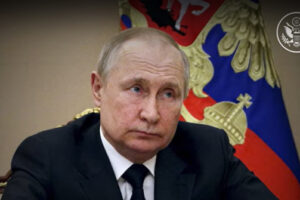Timothy Frye’s ‘Weak Strongman’ Overturns the Putin Myth; The book considers “The Limits of Power in Putin’s Russia.”

(Moscow Times – Yanina Sorokina – Sept. 4, 2022) Russia’s invasion of Ukraine is often called “Putin’s war,” based on the assumption that Russia’s authoritarian leader has a firm grip on power and virtually single-handedly influences Russian politics. And as the only country to wage a war in Europe in the 21st century, Russia is viewed as an exceptional state that operates by its own opaque and mysterious rules.
Timothy Frye’s book, “Weak Strongman: The Limits of Power in Putin’s Russia,” a 2022 Pushkin House Book Prize nominee, questions those assumptions and takes a closer look at Russia’s political system and Putin’s role. Looking at the regime in the context of other similar authoritarian states and rulers, Frye demonstrates that “even autocrats as influential as Putin face significant constraints and difficult choices over policy because of the nature of autocratic rule.”
Timothy Frye is a political science professor at Columbia University who specializes in comparative politics and political economy. He has had decades of professional and personal experience in Russia, collaborating with Russian scholars varying in age and expertise, teaching at Russia’s Higher School of Economics, and conducting cutting-edge survey-based academic research. This has given him unique qualifications to bridge the gap between scholarship on Putinism and other authoritarian regimes.
“Weak Strongman” starts with the dilemmas Russian president Vladimir Putin faces. Even as he established a personalist autocracy, Putin is not entirely free as a decision-maker. Russia’s ruler is forced to make concessions constantly, his choices are limited, and his attempts to intimidate and appear nearly omnipotent threaten the long-term stability of both Russia and Putin.
Frye lays bare Putin’s paradox of power: by making institutions like the electoral system and the judicial system weak, he denies himself a “safe” landing at the end of his rule and robs Russia of a predictable transfer of power and future development. Frye also pulls back the curtain on the extraordinary effort required to stay in power. Fabricating votes in elections turns out to be far more difficult than a layman imagines. On one hand, the numbers should convince political elites that Putin is still popular with the public but, on the other hand, the numbers shouldn’t be so high that citizens complain about them.
Written and published before the war in Ukraine, “Weak Strongman” is as important — if not more so — today. In the chapter entitled “Great Power Posing,” Frye analyzes the major issues now widely discussed as the war in Ukraine rages: over-reliance on military power, the use of standard anti-western rhetoric typical of autocrats, the trade-off between economic growth and military needs. These and other issues are addressed by Frye in a readable style that combines anecdotes from his own extensive experience in the country with the latest research findings. This is an essential book that unravels the usual thinking about Vladimir Putin and his hold on power.
[article also appeared at themoscowtimes.com/2022/09/04/timothy-fryes-weak-strongman-overturns-the-putin-myth-a78703]
